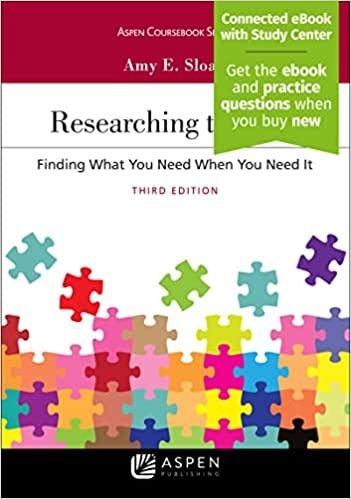Question
Question #2 (5 points): Review all of section 13-1a concerning The Lawyer and Hiring a Lawyer and listen to the lecture. For your business, you've
Question #2 (5 points):
Review all of section 13-1a concerning "The Lawyer" and "Hiring a Lawyer" and listen to the lecture.
For your business, you've done the wise thing and hired an experienced small business attorney to help guide you in the growth of your business.
According to the text and lecture,
- When is the best time to hire a good lawyer?
- What is the primary goal for a lawyer in representing a client in a contract negotiation?
- Identify three common aspects of the typical relationship between a lawyer and a client in the negotiation of the deal?
- What four warning signs should you look out for in hiring your lawyer?
- What typically constitutes the best deal for the respective parties?
Text: usinesspeople, not surprisingly, tend to focus more on business than on the technicalities of contract law. However, ignoring the role of a written agreement can lead to serious trouble. Both of the clients in this opening scenario ended up being bound by a contract they did not want. You have been studying the theory of contract law. This chapter is different: Its purpose is to demonstrate how that theory operates in practice and help you determine if the legal agreement reflects your business deal. We will look at the structure and content of a standard written contract and answer questions such as: What do all these legal terms mean? What provisions should be included? By the end of the chapter, you will have a road map for understanding a written contract.1 To illustrate our discussion of contract provisions, we will use a real movie contract between an actor and a producer. For reasons of confidentiality, however, we have changed the names. 13-1 CREATING A CONTRACT Before we begin our discussion of written contracts, it is important to ask: Do you need a written agreement at all? Oral contracts can certainly be successful, but there are times when an agreement should def initely be in writing: 1. The Statute of Frauds requires it. 2. The deal is crucial to your life or the life of your business. 3. The terms are complex. 4. You do not have an ongoing relationship with the other party. Once you decide you need a written contract, then what? 13-1a The Lawyer Businesspeople sometimes refer to their lawyers as the business prevention department. For this reason, they may be reluctant to ask an attorney to draft a contract for fear of the time and expense that lawyers can inject into the process. And they worry that the lawyers will interfere in the business deal itself, at best causing unnecessary hindrance, at worst killing the deal. Part of the problem is that lawyers and clients have different views of the future. Lawyers and Clients Businesspeople are optimiststhey believe that they have negotiated a great deal and everything is going to go wellsales will boom, the company will prosper. Lawyers have a different perspectivetheir primary goal is to protect their clients by avoiding litigationnow and in the futureor if litigation does occur, making sure their client wins. For this reason, lawyers are trained to be pessimiststhey try to foresee and 1
Unit 3 Contracts and the UCC protect against everything that can possibly go wrong. Businesspeople sometimes view this lawyering as a waste of time and a potential deal killer, but it may just save them from some dire failure. Lawyers also prefer to negotiate touchy subjects at the beginning of a relationship, when everyone is on friendly terms and eager to make a deal, rather than waiting until trouble strikes. In the long run, nothing harms a relationship more than unpleasant surprises. One advantage of using lawyers to conduct these negotiations is that they can serve as the bad guys. Instead of the client raising tough issues, the lawyers do. Many a client has said, "but my lawyer insists...." If the lawyer takes the blame, the client is able to maintain a better relationship with the other party. Of course, this lawyerly protection comes at a costlegal fees, time spent bargaining, the hours required to read complex provisions, and the potential for goodwill to erode durng negotiations. Hiring a Lawyer If you do hire a lawyer, be aware of certain warning signs. Although the lawyer's goal is to protect you, a good attorney should be a deal maker, not a deal breaker. She should help you achieve your goals and, therefore, should never (or, at least, hardly ever) say, You cannot do this. Instead, she should say, "Here are the risks to this approach" or "Here is another way to accomplish your objective." Moreover, your lawyer's goal should not be to annihilate the other side. In the end, the contract will be more beneficial to everyone if the parties' relationship is harmonious. Trying to exact every last ounce of flesh, using whatever power you have to an abusive extreme, is not a sound long-term strategy. In the end, the best deals are those in which all the parties' incentives are aligned.
Step by Step Solution
There are 3 Steps involved in it
Step: 1

Get Instant Access to Expert-Tailored Solutions
See step-by-step solutions with expert insights and AI powered tools for academic success
Step: 2

Step: 3

Ace Your Homework with AI
Get the answers you need in no time with our AI-driven, step-by-step assistance
Get Started


